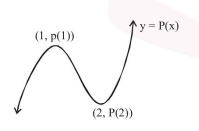If $\mathrm{p}(\mathrm{x})$ be a polynomial of degree three that has a local maximum value 8 at $x=1$ and a local minimum value 4 at $x=2$; then $p(0)$ is equal to:
Correct Option: , 4

Since $p(x)$ has realtive extreme at $x=1 \& 2$
so $\mathrm{p}^{\prime}(\mathrm{x})=0$ at $\mathrm{x}=1 \& 2$
so $p^{\prime}(x)=0$ at $x=1 \& 2$
$\Rightarrow \mathrm{p}^{\prime}(\mathrm{x})=\mathrm{A}(\mathrm{x}-1)(\mathrm{x}-2)$
$\Rightarrow \mathrm{p}(\mathrm{x})=\int \mathrm{A}\left(\mathrm{x}^{2}-3 \mathrm{x}+2\right) \mathrm{dx}$
$\mathrm{p}(\mathrm{x})=\mathrm{A}\left(\frac{\mathrm{x}^{3}}{3}-\frac{3 \mathrm{x}^{2}}{2}+2 \mathrm{x}\right)+\mathrm{C}$ ......(1)
$P(1)=8$
From (1)
$8=A\left(\frac{1}{3}-\frac{3}{2}+2\right)+C$
$\Rightarrow 8=\frac{5 \mathrm{~A}}{6}+\mathrm{C} \Rightarrow 48=5 \mathrm{~A}+6 \mathrm{C}$.......(3)
$P(2)=4$
$\Rightarrow 4=\mathrm{A}\left(\frac{8}{3}-6+4\right)+\mathrm{C}$
$\Rightarrow 4=\frac{2 \mathrm{~A}}{3}+\mathrm{C} \Rightarrow 12=2 \mathrm{~A}+3 \mathrm{C}$......(4)
From $3 \& 4, C=-12$
So $\mathrm{P}(0)=\mathrm{C}=-12$
